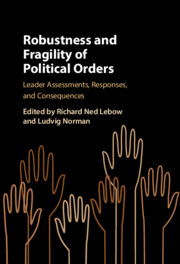Book contents
- Robustness and Fragility of Political Orders
- Robustness and Fragility of Political Orders
- Copyright page
- Contents
- Figures
- Contributors
- 1 Introduction
- 2 Robustness and Fragility of Political Orders
- 3 End of Democracy or Recurrent Conflict: Minimalist Democracy, Legitimacy Crisis, and Political Equality
- 4 Politics and the Administrative State
- 5 Roots in Common: The Fragility–Robustness of Democratic and Ecological Regimes
- 6 The End of Communist Rule in Europe: A Comparative Perspective on the Fragility and Robustness of Regimes
- 7 Democracy’s Fragility and the European Political Order
- 8 The American Fragility–Robustness Nexus
- 9 The Perils of Choice: Structure and Agency in EU Crisis Management
- 10 Conclusions
- Index
8 - The American Fragility–Robustness Nexus
Published online by Cambridge University Press: 25 November 2022
- Robustness and Fragility of Political Orders
- Robustness and Fragility of Political Orders
- Copyright page
- Contents
- Figures
- Contributors
- 1 Introduction
- 2 Robustness and Fragility of Political Orders
- 3 End of Democracy or Recurrent Conflict: Minimalist Democracy, Legitimacy Crisis, and Political Equality
- 4 Politics and the Administrative State
- 5 Roots in Common: The Fragility–Robustness of Democratic and Ecological Regimes
- 6 The End of Communist Rule in Europe: A Comparative Perspective on the Fragility and Robustness of Regimes
- 7 Democracy’s Fragility and the European Political Order
- 8 The American Fragility–Robustness Nexus
- 9 The Perils of Choice: Structure and Agency in EU Crisis Management
- 10 Conclusions
- Index
Summary
In her assessment of US democracy, Chebel d’Appollonia emphasizes three main points. First, Americans perceived the meaning of democracy in a multidimensional way. This explains why political leaders’ estimates of the state of democracy have never been just context-dependent; they have also been ideologically contingent, framed by beliefs in US exceptionalism that are often disconnected from reality. Second, US democracy has been and still is more fragile and more resilient than commonly perceived – which suggests we need to put into perspective both an overconfidence in robustness and pessimistic accounts of fragility. Chebel d’Appollonia therefore examines the relationship between “the weakness of robustness” and “the strength of fragility” in order to demonstrate how robustness and fragility are organically related, for better or worse, in terms of perceptions and practices. Third, assessments of US democracy oscillate between overconfidence and declinism, with no stable equilibrium between these two poles. While it is premature to evaluate what the state of US democracy will be in the coming years, Chebel d’Appollonia identifies major threats that can seriously damage US democracy – such as the denial of actual problems by leaders, or conversely, the use of declinist arguments to legitimize undemocratic practices allegedly designed to protect democracy.
Keywords
- Type
- Chapter
- Information
- Robustness and Fragility of Political OrdersLeader Assessments, Responses, and Consequences, pp. 202 - 228Publisher: Cambridge University PressPrint publication year: 2022



